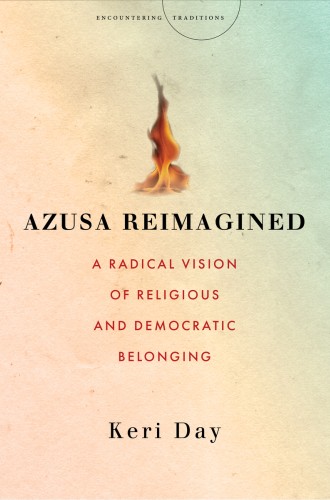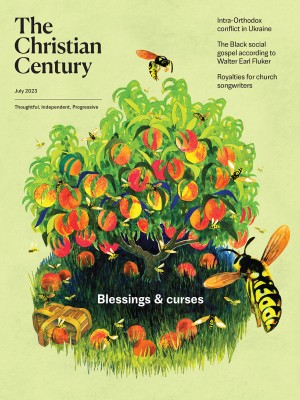The radicalism of Azusa Street
Keri Day places the 1906 revival at the intersection of White evangelicalism, American capitalism, and racism.
As an Afro-Pentecostal womanist raised within and continuing to identify with that tradition, I often struggle to excavate liberative stains within a movement that observers generally characterize as an almost completely otherworldly religious expression, one whose adherents retreat into ecstatic spirituality to escape real-world sociopolitical realities. Moreover, much of the previous work undertaken by White scholars, such as Vinson Synan and Robert Mapes Anderson, relegated the contribution of the movement’s African American leadership to footnotes. By doing so, they failed to treat the significant influence of the African and slave religious heritages with the seriousness it deserves. So I looked forward to engaging political theologian Keri Day’s attentive treatment of the founding event of the fastest-growing expression of global Christianity—and I was not disappointed.
Day’s thoughtful work adds to that of a small cadre of scholars of color, Pentecostal and otherwise, who have attempted to resurrect and highlight the Azusa Street Revival’s significance within American religious history. She goes further, however, placing the 1906 event within the context of the historical interrelationship between White evangelical Christianity, American capitalism, and racism. Much of the focus of Azusa Reimagined is on Day’s strong critique of the exploitative elements of a Christianity in lockstep with what she identifies as America’s racial capitalism.
Read our latest issue or browse back issues.
Day argues that the entire American democratic experiment denigrates and exploits Black people while purportedly promoting a vision of prosperity. She begins by laying out the racial climate of American society at the turn of the 20th century, and then she details how both evangelical leaders and upper-class Black religionists who desired to participate in the capitalist system provided theological support for an inherently racist economic system. Then she identifies how the revival’s unashamed African spirituality and slave religious practices—which White religionists have historically overlooked or dismissed as unimportant—are important for understanding how seemingly innocuous religious practices by seemingly powerless communities can stand as powerful protest and refutation.
Azusa Reimagined details how former slaves and their children who endured Reconstruction-era oppression imbued the revival’s worship with elements of their African and slave heritage that openly challenged the racial, gender, and class hierarchies on which American society was built. In Day’s assessment, the spirituality and communal practices of the revival offer a “radically subversive” critique of America’s racist-capitalist order by rejecting its premise that prosperity is what legitimizes a person’s humanity. Azusa participants’ liturgical practices of speaking in tongues, dancing, singing, tarrying, and communal fellowship allowed them to practice their Christian faith without relinquishing their African identity and reinforced a sense of belonging that contrasted with the individualistic motivations of American capitalism. Participants measured wealth in terms of the wholeness of the entire community rather than as amassing material gain. They based this assessment on what they avowed was a powerful encounter with the living God of the Bible.
At least for a brief period, this inclusive community disregarded social definitions of worth and provided an alternative vision of God’s kingdom in which they could worship God without abandoning their cultural identity. They welcomed marginalized people as full members and refuted exploitive, dehumanizing notions based on distorted understandings of prosperity. This reassessment made room for women—especially Black women—to play important roles within the revival’s liberative community. It also did away with social class as a qualifier for involvement at any level.
The multiracial embrace of African spirituality, racial and gender equality, and disregard for class distinctions confronted and offended the prevailing American religious, social, and political sensibilities, particularly in the way it questioned racist-capitalist assumptions regarding the power of material gain to provide security. In bringing to light the way White evangelicals used racist tropes to interpret Azusa’s religious life, Day uncovers the true character of Christian discourse that was used to deny power to African Americans and other marginalized people.
In her indictment of the White supremacist underpinnings of American capitalism, Day paints evangelical Christianity with a broad brush that doesn’t acknowledge the liberative elements of some White people within the evangelical camp. For example, some Wesleyan theological positions included strong abolitionist and race and gender equality sentiments. These ideas birthed the holiness movement out of which Pentecostalism and Azusa Street emerged. By the time he initiated the revival, African American preacher William Seymour had already witnessed elements of interracial egalitarianism within the Wesleyan holiness evangelicalism.
This is not an easy read, and casual readers might find it difficult to make connections or be satisfied with all that Day contends. As a womanist scholar, she frames the revival’s African spirituality through womanist and queer theologies that call readers to define the terms eroticism and queer beyond purely sexual meanings. While this allows a creative reading of the revival, it may be an unfortunate choice since it is not a lens through which many Pentecostals would view themselves. The use of such terminology, while an attempt to define the movement more broadly, may limit the book’s reach among traditional Pentecostals.
Day’s contention that the Azusa community rejected the market’s promise to secure prosperity is significant in our contemporary period of heightened racial tension and economic chaos. In the end, revisiting and reimagining the revival’s inclusive vision lays bare two options for the Christian community. We can examine and challenge rigid adherence to an economic system that continues to disadvantage vulnerable members of society, or we can retreat into the false promises of an individualistic prosperity gospel that promises, but cannot deliver, wealth and security. Authentic Christian spirituality rejects the latter option.






